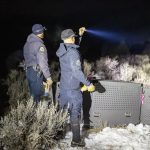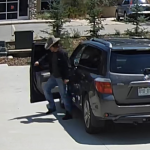Haims: Alzheimer’s Walk 2025 — Early detection

Courtesy photo
Every step taken during this weekend’s 2025 Alzheimer’s Walk brings us closer to a world without Alzheimer’s disease. This annual event unites communities, families, and individuals with one shared goal — to raise awareness and funding for Alzheimer’s care, support, and research. Whether you walk to honor a loved one or to just support the cause, your participation will help raise awareness of a disease that affects millions of people.
This coming weekend’s Walk to End Alzheimer’s — Rocky Mountain will take place in the town of Eagle at the Eagle Pavilion. Registration for the event this Saturday begins at 9 a.m., and the walk will begin around 10 a.m. As you finish the walk, please join the community and Alzheimer’s walkers starting at 11 a.m. at Capitol Public House, with music by renowned The Evolution Live. Come enjoy great food, drinks, and music.
Taking part in the Alzheimer’s Walk is more than just a show of solidarity — it’s a powerful statement of hope. The funds raised directly support an institution dedicated to groundbreaking research, early diagnosis, and improved care for those living with dementia and Alzheimer’s. This organization has the potential to transform countless lives by advancing treatments, providing essential resources to caregivers, and one day finding a cure. By walking, you are actively contributing to a future where no family has to endure the pain of watching a loved one fade away. Your involvement fuels the mission to turn the tide against Alzheimer’s.
Education about Alzheimer’s Disease and early detection of any type of dementia is important, and may provide an opportunity for changing the course of care, promoting the use of effective interventions, and increasing quality of life. Because there is currently no cure, we all need to understand the many factors that could cause it and how we can support research that is focusing on finding a cure.
Over the past decade, not only has vast amounts of research proven that diet and lifestyle changes may assist in delaying the onset of cognitive decline, but researchers have brought to market medications that are providing life changing benefits. Further, researcher are utilizing new technologies such as AI to find success in testing biomarkers that detect signs of cognitive decline long before symptoms are present.
Sheng Zhong, a professor at the UC San Diego Jacobs School of Engineering, and his team have studied a gene called PHGDH, which they had already found might help detect Alzheimer’s disease early through a blood test. Normally, the PHGDH protein has a basic job: it helps make serine, which is an important building block for the body and helps brain cells communicate. With the help of AI, researchers have found that PHGDH might be doing more. The gene also seems to affect other genes that control processes related to Alzheimer’s disease, like stopping the brain from clearing out waste and speeding up the buildup of harmful proteins.
In a later study, they found something even more important: the more active this gene was in the brain, the worse the Alzheimer’s symptoms were. In other words, higher levels of the PHGDH gene’s activity were linked to more severe brain changes caused by the disease.
MIT researchers, working with Harvard scientists, analyzed large datasets from humans and fruit flies to discover new genes and cell pathways involved in Alzheimer’s disease, some of which had never been linked to the condition before. One key finding involved a pathway related to DNA repair. These discoveries open the door to new drug targets, especially important as many existing Alzheimer’s treatments haven’t been very effective.
For years, most Alzheimer’s drugs have focused on removing amyloid plaques in the brain, but with limited results. The new study supports the idea that Alzheimer’s is caused by many different factors, not just one. This means future treatments may need to target several pathways at once to be more effective in slowing or reversing the disease.
This weekend’s Alzheimer’s Walk is not just an event — it’s a movement powered by community, science, and hope. As we gather in Eagle this weekend, we are reminded that early detection and continued research are key to changing the future of Alzheimer’s disease.
Your steps, your support, and your voice all help in finding a cure. Together, we walk not only to remember those we’ve lost but to fight for a future where Alzheimer’s can be detected early, treated effectively, and one day, cured.
If you are inclined, please consider donating to the Visiting Angels’ walk team. You can do this by doing a web search for Alzheimer’s walk teams 2025. You will then click on the link to the 2025 Walk to End Alzheimer’s | Alzheimer’s Association. This will take you to a page where you will see “FIND A TEAM.” Click “FIND A TEAM” and then enter “Angels of the Rockies.”
Or, use this QR code:

We look forward to seeing you there!
Coyote or gray wolf? How to tell the difference in the Roaring Fork Valley
As hunting season gets under way, Colorado Parks and Wildlife is warning those with coyote tags to be aware of the differences between coyotes and wolves.








